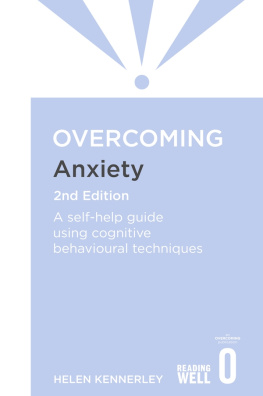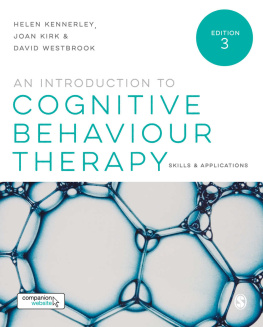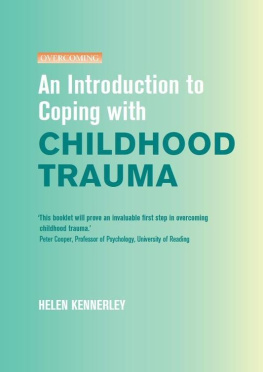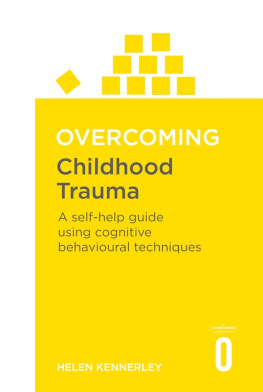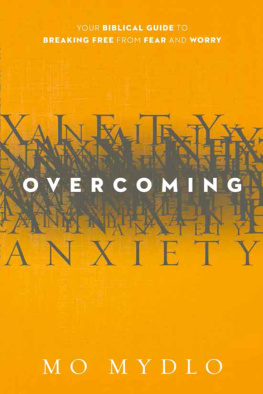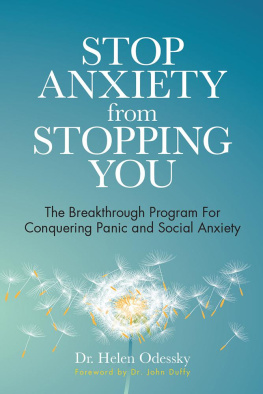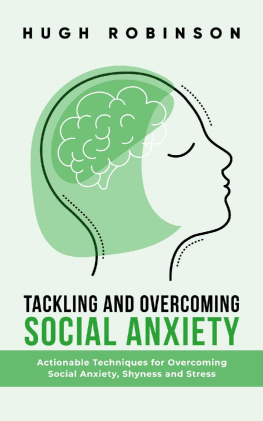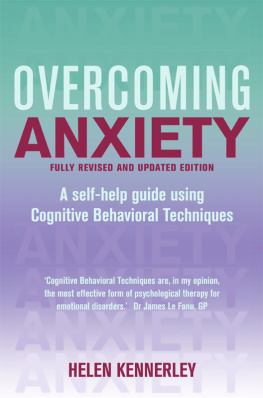Helen Kennerley - Overcoming Anxiety
Here you can read online Helen Kennerley - Overcoming Anxiety full text of the book (entire story) in english for free. Download pdf and epub, get meaning, cover and reviews about this ebook. publisher: Little, Brown Book Group, genre: Religion. Description of the work, (preface) as well as reviews are available. Best literature library LitArk.com created for fans of good reading and offers a wide selection of genres:
Romance novel
Science fiction
Adventure
Detective
Science
History
Home and family
Prose
Art
Politics
Computer
Non-fiction
Religion
Business
Children
Humor
Choose a favorite category and find really read worthwhile books. Enjoy immersion in the world of imagination, feel the emotions of the characters or learn something new for yourself, make an fascinating discovery.
- Book:Overcoming Anxiety
- Author:
- Publisher:Little, Brown Book Group
- Genre:
- Rating:3 / 5
- Favourites:Add to favourites
- Your mark:
- 60
- 1
- 2
- 3
- 4
- 5
Overcoming Anxiety: summary, description and annotation
We offer to read an annotation, description, summary or preface (depends on what the author of the book "Overcoming Anxiety" wrote himself). If you haven't found the necessary information about the book — write in the comments, we will try to find it.
Overcoming Anxiety — read online for free the complete book (whole text) full work
Below is the text of the book, divided by pages. System saving the place of the last page read, allows you to conveniently read the book "Overcoming Anxiety" online for free, without having to search again every time where you left off. Put a bookmark, and you can go to the page where you finished reading at any time.
Font size:
Interval:
Bookmark:
DR HELEN KENNERLEY is a Consultant Clinical Psychologist working with Oxford Health NHS Foundation Trust and a Senior Associate Tutor with the University of Oxford. She is a founder member of the Oxford Cognitive Therapy Centre (OCTC), where she is the Director of its Advanced Cognitive Therapy Studies courses and its M.Sc. She has practised CBT for over twenty-five years, having trained in Oxford and the US, and has written several popular cognitive therapy self-help books and texts. In 2002 she was short-listed for the BABCP award of most influential female cognitive therapist in Britain.
The aim of the Overcoming series is to enable people with a range of common problems and disorders to take control of their own recovery programme.
Each title, with its specially tailored programme, is devised by a practising clinician using the latest techniques of cognitive behavioural therapy techniques that have been shown to be highly effective in changing the way patients think about themselves and their problems.
The series was initiated in 1993 by Peter Cooper, Professor of Psychology at Reading University and Research Fellow at the University of Cambridge in the UK, whose original volume on overcoming bulimia nervosa and binge-eating continues to help many people in the USA, the UK and Europe.
Titles in the series include:
OVERCOMING ANGER AND IRRITABILITY
OVERCOMING ANOREXIA NERVOSA
OVERCOMING BODY IMAGE PROBLEMS
OVERCOMING BULIMIA NERVOSA AND BINGE-EATING
OVERCOMING CHILDHOOD TRAUMA
OVERCOMING CHRONIC FATIGUE
OVERCOMING CHRONIC PAIN
OVERCOMING COMPULSIVE GAMBLING
OVERCOMING DEPERSONALIZATION AND FEELINGS OF UNREALITY
OVERCOMING DEPRESSION
OVERCOMING DISTRESSING VOICES
OVERCOMING GRIEF
OVERCOMING HEALTH ANXIETY
OVERCOMING INSOMNIA AND SLEEP PROBLEMS
OVERCOMING LOW SELF-ESTEEM
OVERCOMING MOOD SWINGS
OVERCOMING OBSESSIVE COMPULSIVE DISORDER
OVERCOMING PANIC AND AGORAPHOBIA
OVERCOMING PARANOID AND SUSPICIOUS THOUGHTS
OVERCOMING RELATIONSHIP PROBLEMS
OVERCOMING SEXUAL PROBLEMS
OVERCOMING SOCIAL ANXIETY AND SHYNESS
OVERCOMING TRAUMATIC STRESS
OVERCOMING WEIGHT PROBLEMS
OVERCOMING WORRY
OVERCOMING YOUR CHILDS FEARS AND WORRIES
OVERCOMING YOUR CHILDS SHYNESS AND SOCIAL ANXIETY
OVERCOMING YOUR SMOKING HABIT
OVERCOMING ANXIETY
A self-help guide to using
Cognitive Behavioral Techniques
Helen Kennerley

Robinson
London
COPYRIGHT
Published by Robinson
ISBN: 978-1-47211-393-7
Copyright Helen Kennerley, 1997, 2014
The moral right of the author has been asserted.
All rights reserved. No part of this publication may be reproduced, stored in a retrieval system, or transmitted, in any form or by any means, without the prior permission in writing of the publisher.
The publisher is not responsible for websites (or their content) that are not owned by the publisher.
Robinson
Little, Brown Book Group
Carmelite House
50 Victoria Embankment
London, EC4Y 0DZ
www.littlebrown.co.uk
www.hachette.co.uk
Important Note
This book is not intended as a substitute for medical advice or treatment. Any person with a condition requiring medical attention should consult a qualified medical practitioner or suitable therapist.
Although we have tried to trace and contact copyright holders before publication, this has not been possible in all cases. If notified, the publisher will be pleased to correct any errors or omissions at the earliest opportunity.
Dedicated to the memory of Liz Campbell (19542010)
In 1980 I arrived in Oxford and met the two psychologists who influenced this book. The first was Peter Cooper, the series editor of the Overcoming series, and the second was Liz Campbell. They introduced me to cognitive therapy and helped me appreciate its potential they got me hooked on CBT. I suspect they used it in helping me overcome my own anxieties about settling in Oxford, and I remain very grateful for their generous conversations, their encouragement and support.
Sadly, Liz Campbell died recently and I want to dedicate this second edition of the book to her if anyone managed stress well and helped others to deal with it, it was Liz. She was a remarkable woman: warm, witty, determined to enjoy life and to help others enjoy life. Anyone who has met Liz will have stories to tell about how she inspired them. I cant imagine that anyone would fail to say that she was extraordinary. Dr Campbell was a champion: she was an excellent clinician, she pioneered psychology courses, was president of the British Psychological Society, and wrote texts that changed the face of stress management in the police force. She was also a brave woman who always did what she thought was right, and Ill never forget being in Asia with her doing charity work. For the most part I sought the safety of the British Council buildings and adopted the approach of never upsetting anyone and staying where it was safe. She took on officials, slipped out at night to attend forbidden meetings, got involved in the politics and continued to support these causes from the UK. That was Liz brave, principled, an example to us all.
Liz was an inspiration, as are each of the people with whom Ive been fortunate enough to work clinically. I am indebted to the patients who have bravely shared their difficulties and their recoveries, and I am indebted to outstanding colleagues such as Joan Kirk, Gillian Butler, Melanie Fennel, Christine Padesky and the late David Westbrook who have shared their wisdom over the years.
Writing a book like this takes time away from loved ones and I am grateful, too, for the indulgence of my children and husband. Thank you.
In the fifteen years since this book was first published, some things in the world of anxiety management remain unchanged. In particular, it is still a fact that we need worries, fear and anxieties to survive and that we are in the business of managing unhelpful anxieties not getting rid of them. This, as you will see, remains a theme throughout this new book.
However, there have been some key developments in the last decade and a half that are reflected in this second edition. We know so much more about the brain and stress, about the problems caused by worry, about the importance of compassion in recovering from psychological problems, about the role of exercise in coping. Ive tried to embrace these developments in this second edition and so youll notice familiar messages and some new ones, too.
Something else that has happened since 1997, when the first edition of this book was published, is that there has been increasing research on very particular anxiety disorders, and the Overcoming range reflects this: Constable & Robinson now offer self-help books that focus on Panic, Worry, Social Anxiety, Obsessive Compulsive Disorder, Health Anxiety and Post-traumatic Stress. Im really pleased to be able to say that you now have so much more to guide you in overcoming different forms of anxiety but I also hope that you will still find that this single volume makes a difference.
The approach this book takes in attempting to help you overcome your problems with anxiety is a cognitive behavioural one. A brief account of the history of this form of intervention might be useful and encouraging. In the 1950s and 1960s a set of therapeutic techniques was developed, collectively termed behaviour therapy. These techniques shared two basic features. First, they aimed to remove symptoms (such as anxiety) by dealing with those symptoms themselves, rather than their deep-seated underlying historical causes (traditionally the focus of psychoanalysis, the approach developed by Sigmund Freud and his associates). Second, they were scientifically based, in the sense that they used techniques derived from what laboratory psychologists were finding out about the mechanisms of learning, and they put these techniques to scientific test. The area where behaviour therapy initially proved to be of most value was in the treatment of anxiety disorders, especially specific phobias (such as extreme fear of animals or heights) and agoraphobia, both notoriously difficult to treat using conventional psychotherapies.
Next pageFont size:
Interval:
Bookmark:
Similar books «Overcoming Anxiety»
Look at similar books to Overcoming Anxiety. We have selected literature similar in name and meaning in the hope of providing readers with more options to find new, interesting, not yet read works.
Discussion, reviews of the book Overcoming Anxiety and just readers' own opinions. Leave your comments, write what you think about the work, its meaning or the main characters. Specify what exactly you liked and what you didn't like, and why you think so.

